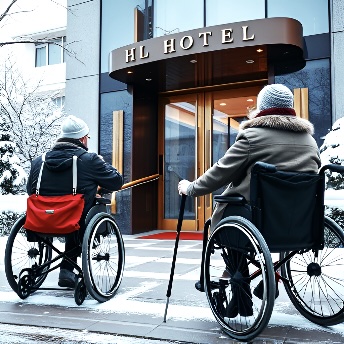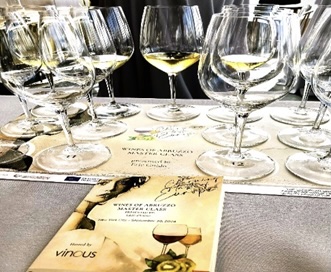
Difference Between Should Do and Must Do
Americans with Disabilities Act of 1990. Compliance in Smart Hotels
Welcome to the era of smart hotels, where the Internet of Things (IoT) weaves seamless, personalized experiences that redefine guest comfort and convenience. From voice-activated room features and smart lighting that adapts to individual preferences, to climate control systems that adjust to enhance relaxation, technology is revolutionizing the hospitality experience. Hotels are now empowered to anticipate guest needs, delivering a stay that feels tailored, responsive, and effortlessly luxurious—transforming the way they connect with and serve each guest.
While some hotels embrace these advancements to stay competitive, others are slower to adapt. Those that do often prioritize enhancing guest experiences, improving operational efficiencies, and differentiating from competitors. In this context, Artificial Intelligence (AI) and data analytics are driving forces, optimizing everything from guest services to pricing strategies.
Inclusive and Future-Ready Hotel Design
Designing hotels for today and tomorrow means prioritizing inclusivity, with thoughtful accommodations for guests of all ages, abilities, and needs. This requires collaboration among investors, designers, and managers ensuring that every guest feels welcome and comfortable.
Planning Requirements: Hotel Concept Checklist
- 1. Accommodations for Autistic Guests
- Sensory-Friendly Rooms: Soundproofing, adjustable lighting, and blackout curtains
- Quiet Zones: Designated quiet areas for guests needing a peaceful retreat
- Visual and Audio Support: Clear signage with pictures, symbols, and audio to aid navigation
- Calming Spaces: Sensory rooms with soft furnishings, weighted blankets, and calming color
2. Accommodations for Hearing Impaired Guests
- • Visual alarms in guest rooms connected to the building’s emergency alarm system
- • Visual notification devices in guest rooms to alert persons with hearing impairments to incoming telephone calls and door knocks or bells
- • Electrical outlets to facilitate the use of text telephones
3. Accommodations for Sight-Impaired Guests
- Tactile Signage: Braille on room numbers, elevators, and public areas for easy navigation
- Shuttle Buses. Shuttle bus drivers are trained to offer assistance to people who are blind or who have low vision
- Drivers announce all stops to riders who are blind or who have low vision
- Service animals such as guide dogs are permitted to accompany their handlers
- Wayfinding. Staff who assist guests at the front door offer assistance to guests who are blind or who have low vision in finding the Registration Desk or other hotel facilities
4. Biological Challenges
- Air Purification Systems: Rooms equipped with advanced filtration for guests with allergies or respiratory sensitivities
- Non-Allergenic Bedding: Hypoallergenic mattresses, pillows, and linens to minimize allergens
- Chemical-Free Cleaning Practices: Use natural, fragrance-free cleaning products to support guests with chemical sensitivities
- Use contrasting colors and textures to help guests differentiate spaces and objects easily
5. Flexible Dining Options and Environments
- Dining Choices: Quiet dining rooms, outdoor seating, and private dining areas
- Special Dietary Options: Menus catering to dietary needs such as gluten-free, vegan, and allergy-friendly
- Interactive Menus: Digital menus with visual and audio descriptions
6. Gender-Neutral Accommodations
- Inclusive Room Design: Rooms that avoid gender-specific decor and use neutral colors and furnishings
- Gender-Neutral Bathrooms: Facilities are accessible to all genders, featuring privacy and safety measures
- Staff Training: Training programs for staff on inclusivity and sensitivity to diverse gender identities
- Policies and Signage: Clear policies promoting inclusivity; signage that reflects gender neutrality
- Flexible Check-In Options: A check-in process allowing guests to choose titles that best represent their identity
- Safety Features: Enhanced security measures to ensure all guests feel safe and welcome.
- Community Engagement: Partnerships with local LGBTQ+ organizations to foster a supportive environment
7. Going Green
Exterior:
- Rooftop Gardens: Accessible green spaces, including bee hives, offer guests with disabilities a tranquil escape
- Vertical Gardens: Enhances air quality and aesthetics with green walls on exteriors and interiors.
- Green Pathways: Walking trails with native plants offer eco-friendly spaces ideal for guests with anxiety or PTSD
- Rainwater Harvesting: Capture and use rainwater for irrigation and other non-potable needs
Interior:
- Indoor Gardens: Large indoor plant installations in the lobby and common areas
Natural Lighting: Maximize sunlight with large windows and skylights for a vibrant, energy-efficient space - Indoor Gardens: Large indoor plant installations in the lobby and common areas
Natural Lighting: Maximize sunlight with large windows and skylights for a vibrant, energy-efficient space
8. Guided Assistance
- Staff trained to help visually impaired guests navigate the hotel
9. Handicap Accessibility
- Accessible Rooms: Roll-in showers, grab bars, adjustable beds, lower light switches, and accessible furniture
- Elevators: Spacious with Braille and audio assistance
- Wheelchair Accessibility: Wide doorways, ramps, and smooth surfaces throughout indoor and outdoor spaces, including recreation areas and pools
10. Pet-Friendly Policies
- Hotels must develop pet-friendly policies, allowing guests to bring their pets into their hotel rooms
11. Support for Guests with PTSD
- Tranquil Spaces: Quiet and serene areas throughout the hotel
- Comfortable Environments: Soundproofed rooms with calming colors and aromatherapy options
12. Sustainable Materials
- Use eco-friendly materials like bamboo, reclaimed wood, and recycled metals for furniture, flooring, and design
13.Therapeutic Services
- On-site therapists and support animals available upon request
14. Voice-Activated Assistants
- Smart Room Controls: In-room technology to control lights, temperature, and request services with ease
- Accessible Navigation Apps: Mobile apps that provide detailed information about the hotel layout, including accessible routes, using GPS and indoor positioning.
- Assistive Listening Devices: Hearing loops and FM systems in meeting rooms and public areas to aid guests with hearing impairments.
- Visual Assistance Technology: Apps that use AI to assist sight-impaired guests by identifying objects, reading menus, or providing navigation assistance.
- Automated Door Openers: Doors that can be opened with a button or remote control, aiding those with mobility impairments.
- Emergency Alerts: Visual alarms and tactile alert systems for guests who are deaf or hard of hearing.
- Customized Guest Profiles: Technology that allows hotels to store and manage guest preferences and needs, ensuring tailored services for individuals with disabilities.
Must Do
Hotels must embrace inclusivity to remain viable because the demand for accessible accommodations is growing, and failing to meet this need risks alienating a large segment of potential guests. Inclusivity in hospitality means making every guest feel welcomed, valued, and comfortable, regardless of physical, sensory, or cognitive abilities. With millions of travelers globally requiring accommodations that meet various accessibility needs, hotels prioritizing inclusivity can tap into this expanding market and earn lasting loyalty from guests who value accessible and thoughtful service.
Beyond catering to a broader clientele, inclusivity strengthens a hotel’s reputation. Travelers select brands demonstrating social responsibility, and inclusivity aligns with this value. An inclusive approach also sets hotels apart from competitors and fosters a positive public image, enhancing brand loyalty and driving revenue.
Additionally, inclusive practices future-proof the business by aligning with legal requirements and evolving accessibility standards. By taking proactive steps to ensure accessibility, hotels avoid costly retrofits later on and establish themselves as leaders in a progressive, forward-thinking industry. Inclusivity is not just an ethical imperative; it’s a business strategy that ensures a hotel’s relevance, competitiveness, and success in an increasingly conscientious market.





